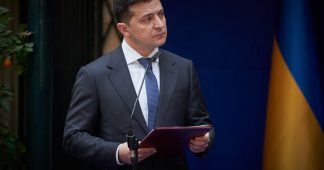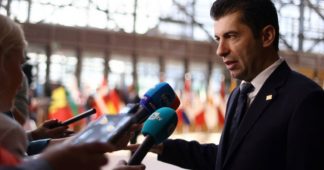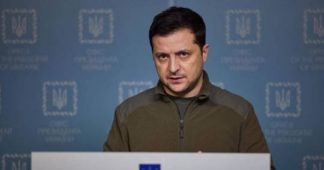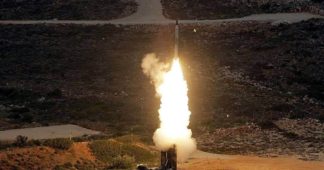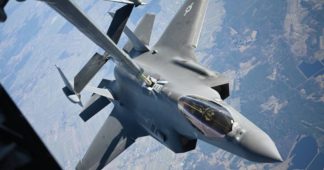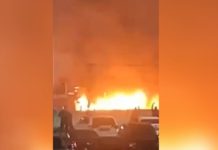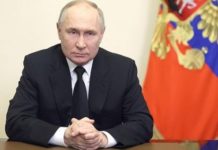By Dmitriy Kovalevich, monthly report for March 2023
(Dmitriy Kovalevich is the special correspondent in Ukraine of the New Cold War.org website publication. He writes a monthly report for the website on the situation in Ukraine. )
Ukraine ‘counterattack at all costs,’ urge Western countries
March marks the end of the 13th month of the Russian military operation in Ukraine. Hostilities in Ukraine have slowed because March in Ukraine is a month when the roads are muddy and heavy equipment cannot pass over them. Military trenches are flooded with water, and travel or evacuation becomes problematic, especially in combat areas where roads are already wrecked. Both sides in the conflict are now gathering their forces, and both sides are warning about an impending large-scale counterattack by the enemy once the ground dries out sufficiently.
Ukrainian forces are being pushed into a counterattack by their Western sponsors, primarily the United States. Many voices in Ukraine and in the West are worrying that support for Ukraine may wane in the face of worsening economic conditions in their respective countries. Tanks, armoured personnel carriers and ammunition continue to cross Ukraine’s western border and be shipped toward the front. The United States has been soliciting and collecting these arms from its satellites around the world, including Bulgaria, Poland, South Korea and Canada.
Ukrainian MP Geo Leros (formerly of Ukraine president Zelensky’s ‘Servant of the People’ party) said in March that the purchase of weapons with Western loans has brought considerable profit to his former colleague Zelensky. “In 2022, the Ministry of Defense, through the state enterprise Progress, purchased Bulgarian-made shells. The overpayment on these three contracts amounted to 6.7 billion hryvnias (170 million euros), meaning it went into someone’s pocket, he said: “We understand that this money has gone into the pockets of Yermak and Zelensky’s organized crime groups.
In late March, Czech President Petr Pavel said in an interview with Germany’s Suddeutsche Zeitung that Prague had provided maximum assistance to Ukraine and had reached the limit of its capabilities. “The Czech Republic has helped Ukraine with arms deliveries as much as it could, but it no longer has the capacity to do so,” the politician said.
According to Pavel, the Czech Republic has the ability to produce air defense products and ammunition, but the main problem is the lack of qualified personnel in the country. He noted that in theory, this problem could be solved by inviting Ukrainian workers, but the public appetite for such is low. A wave of rallies have taken place in the country demanding expulsions of Ukrainian refugees from the country.
The Czech president also noted in another interview that support for Ukraine is entirely dependent on U.S. domestic policy, emphasizing the dependent nature of EU countries.”If U.S. support decreases, support from a number of European countries will also decrease. Ukraine should take this into account,” Pavel added.
The Polish news outlet Rzeczpospolita reported on March 19 that Pavel believes Kiev has only one chance for a ‘counteroffensive’ because U.S. attention risks switching to the Pacific region and the U.S. fight to weaken China. He said, “I believe that Ukraine will have only one chance to launch a big counteroffensive. So if they decide to start one and fail, it will be extremely difficult to get funds for the next one.”
The situation described by the Czech president speaks to the subordination of EU countries to the United States. It also shows how Ukraine is being pressured into suicidal counteroffensives at the cost of thousands of lives of its citizens for the sake of U.S. global interests.
Dan Rice, advisor to the chief of staff of the Armed Forces of Ukraine and president of the American University Kyiv, told a Ukrainian publication that Ukraine is preparing “a powerful counteroffensive that will shock the whole world”. Here it should be recalled that Ukrainian officials and their American masters have talked about a powerful counteroffensive throughout the past winter. Military operations are not usually announced in advance, to say the least, in order to safeguard the factor of surprise. So the frequent repetitions of the theses of a ‘quick turnaround’ and a ‘powerful counteroffensive’ in preparation suggest that the U.S. needs to keep repeating ‘soon, soon,’ to its own population and those of foreign allies. This could also be a real push on Zelensky into a slaughter at any cost. Indeed, this is the price Zelensky has been paying in the fight by him and his governing regime against a Russian army three or four times the size of that of Ukraine.
The state of Ukraine’s armed forces and the forced conscription it relies upon
In mid-March, a Ukrainian battalion commander gave a rather frank and honest account of the state of Ukraine’s army to the Washington Post. The Post reports, “Kupol, a lieutenant colonel, said his battalion is unrecognizable. Of about 500 soldiers, roughly 100 were killed in action and another 400 wounded, leading to complete turnover. Kupol said he was the sole military professional in the battalion, and he described the struggle of leading a unit composed entirely of inexperienced troops.”
Following the publication of the report in the Post, Kupol was demoted. He then wrote a personal account of this demotion, saying the harsh reaction to his original comment showed Kiev’s desire to hide at any cost data on losses and the state of the army so as not to lose U.S. funding for the coming year, even if this means more and many deaths of Ukrainian citizens. After his demotion, Kupol quit the military service.
Many Ukrainian authorities benefit from keeping the war drawn out as long as possible for additional reasons. The bribes being paid by men to avoid their call-up to obligatory military service have reached as high as US$32,000, according to the Open Ukraine telegram channel. The publication writes, “We are helping one of our writers right now to get her son out of Bakhmut. We reached the military recruitment office and were offered an option to remove the fellow from the front lines take him across the border into Europe. The cost of the service was $32,000. If we had done the same thing at the stage of the call-up notice for military service, the cost would have been $12,000. The military registration and enlistment offices have never seen such money before, and the revenues [from bribes] are being evenly distributed vertically towards the top. Do you think anyone would turn down that kind of blood money? It turns out that it is profitable for the U.S. to fight to the last Ukrainian, and it is profitable for the members of the occupation administration [as dissident news outlets in Ukraine refer to the governing regime in Kyiv] to draft and send recruits to their deaths.”
In late March, Andriy Demchenko, spokesman for the State Border Guard Service of Ukraine, said that the service is negotiating with European countries to return to Ukraine those Ukrainian male fugitives who managed to escape from the country. So for all their statements about democracy by Western countries, we are seeing them readying to deport Ukrainians and condemn them to military service, quite possibly risking death which they took desperate measures to avoid. Earlier, Ukrainian officials dismissed threatened deportations of Ukrainian men from Europe as “Russian propaganda”.
Russian military expert Sergey Kolyasnikov warns on Telegram that the Ukraine armed forces will try to strike back in April. “Today, the entire Russian Federation must shrink into a spring in order to inflict a decisive defeat on the Ukrainian Nazis and the U.S. and NATO powers supporting them. Only after that can any negotiations become possible because the West, including United Nations officials, are telling us directly: ‘No negotiations until after we try [to regain lost territory].’
“This desire to ‘try’ must be discouraged, if not forever, then at least for a long time,” writes Kolyasnikov.
Damaged homes not repaired, rebuilt; no help
Despite billions in Western financial aid and loans, the residents of Ukraine are still not receiving compensation for their destroyed or damaged homes. No repairs are being made.
The residents of Borodyanka near Kiev are complaining about the inaction of officials to restore their destroyed homes. According to local resident Alexander Pinchuk, nothing has changed in the town during the past year. “Borodyanka has remained as destroyed as it was. The only thing done during this time was to demolish a few houses. No one does anything else. In Borodyanka, there are only scandals, intrigues and investigations”, says Pinchuk. He reports on Telegram that even minor damage to homes and buildings is not being repaired.
Other residents of the city, too, are complaining that Ukrainian authorities are deliberately refusing to repair damaged homes. They say authorities are using the city as an “open air museum” to bring Western politicians for public relations purposes.
Meanwhile, the Ukrainian military administration in cities near the frontline in Donbass is preparing to introduce forced evacuation of civilians from Avdiivka [Donetsk region] and adjacent areas. This is being done all along the front line in Donbass, from Seversk to Ugledar (approximately 200 kilometers apart). Avdivka is located a mere 20 km from the city center of Donetsk and 60 km south of the war-ravaged city of Artyomovsk (called Bakhmut in Ukraine).
Many residents of heavily damaged Bakhmut are deliberately hiding in order to avoid a forced evacuation from the city, according to Pavlo Kirilenko, the head of the Ukraine military administration for Ukraine-occupied territory in the Donetsk republic. He told a media briefing there are currently some 3,000 people still living in Bakhmut, including 32 children. “These are the people, I can responsibly say, who don’t want to leave the city at all. There is an extremely dangerous amount of work done to evacuate them. But people are not only refusing to leave, they even hide in order not to leave,” Kirilenko says.
A similar situation exists in Avdiivka, which has also all-but ceased to exist during the fighting. Ukrainian authorities complain that residents are refusing to evacuate and are hiding children from the Ukrainian military. For more than a year, these people have been hiding in basements with their children, refusing to evacuate from the completely destroyed city, which has almost no intact houses still standing, as well as no electricity, heating or running water. Their motive for staying put, putting their lives at risk, is to await the arrival of Russian troops.
International Criminal Court ‘indicts’ Russian leader for transfer to safety of children from war zones
In this regard, it is noteworthy that in March, the International Criminal Court (which neither the U.S., Russia, nor Ukraine recognize) issued an arrest warrant for the Russian president charging him and the Russian government with illegal evacuations of children from the city of Mariupol during the intense fighting in the spring and early summer of 2022 that saw widespread damage to housing and to civilian infrastructure. The children in question were moved to safety and accommodated at children’s holiday camps in western Russia. The ICC is treating this as ‘abduction’.
The Russian side claims that the children will return once it is safe for them to do so. The Ukrainian side resents, above all, the fact that the children brought to the holiday camps are being entertained and occupied, in part, by Soviet-era cartoons and programs which happen to express principles of anti-fascism. Ukrainian officials say this may turn the children into opponents of Ukrainian nationalism.
The International Criminal Court, like the Western media, has conveniently remained silent about the massive evacuations of children in Vietnam during the American War. Operation Babylift, for example, abducted thousands of Vietnamese children from the country, without the consent of their families, to the United States as well as to Australia, France, West Germany and Canada. Several dozen of the children died in plane crashes.
As a result of the ICC ‘indictment’, Ukraine’s Foreign Minister Dmytro Kuleba is now voicing a curious concept of peace in Ukraine. He says Kyiv is not refusing to negotiate peace, but the ICC warrant makes direct talks with Russian president Vladimir Putin impossible. In other words, even if Moscow agreed to withdraw its troops beyond the 1991 borders of post-Soviet Ukraine, Zelensky would not be able to sign such a peace with the Russian president due to the ‘criminal prosecution’ undertaken against him.
Many pro-Ukraine observers note that the ICC warrant was specifically timed to coincide with the visit of China’s President Xi Jinping’s visit to Moscow on March 20 – 22. They hoped that the warrant would cause the Chinese president to cancel his visit and thereby disrupt the developing Russia-China alliance (which Ukraine ideologues are beginning to call an ‘axis of evil’).
Anti-fascist underground in Ukraine
In March, members of an anti-fascist underground group were detained by special police services in western Ukraine. They were all members of the underground Communist Party of the Soviet Union. The organization demands the denazification of Ukraine and, according to the Ukrainian secret police, it consisted of 45 people meeting in safe houses.
The growing season is arriving amidst very harsh economic conditions
In March, Ukraine began its spring grain sowing effort. The country has long been considered the breadbasket of Europe and is a major supplier of grains as well as sunflower oil to Europe. But Ukrainian farmers say that their financial reserves are near exhaustion and so they are actively seeking funding assistance from Western sponsors. The ‘Ukrainian Club of Agrarian Business’ is reporting a sharp rise of 25 per cent in expenses for the 2023 sowing season, compared with 2022. Some smaller farmers speak of 50 per cent rises in costs as compared with the previous year. The most costly item for them is mineral fertilizers.
This year, the sowing campaign in Kirovograd region (in the geographic center of Ukraine) will be conducted mostly by elderly pensioners. There are almost no tractor drivers left in the region; they were previously drafted into the armed forces. Vladimir Voloshanovsky, head of an agricultural enterprise in the village of Velyka Vyska claims that 12 tractor drivers and machinists were drafted from his farm alone. He is the only adult male left, but only because he was demobilized in August 2022 due to reaching the age of 60. Now he is trying to negotiate with five pensioners who once had experience of working on a tractor.
Agricultural trader Rafael Goroyan, speaking on behalf of the Prometheus grain trading company in Ukraine, recently told the Ukrainian edition of Forbes magazine that he expects many bankruptcies of agricultural traders in 2023. “The country harvested about 60 million tons this past growing season, compared to 120 million tons the year before. Next season, we will probably harvest 40 million tons and exports will fall to 20 million tons,” says Goroyan. He says agricultural producers are not profitable as they face the new growing season.
According to Forbes Ukraine, Ukraine’s agro-industrial companies exported US$21 billion of products in 2022, down from $24 billion in 2021.
Ukraine is risking losing its status as a reliable global supplier of agricultural products at the same times at sanctions against Russia disrupt the sales of its agricultural products in many countries. This will only increase the threat of global hunger, and it will even create serious food supply disruptions in the developed Western countries.
We remind our readers that publication of articles on our site does not mean that we agree with what is written. Our policy is to publish anything which we consider of interest, so as to assist our readers in forming their opinions. Sometimes we even publish articles with which we totally disagree, since we believe it is important for our readers to be informed on as wide a spectrum of views as possible.
